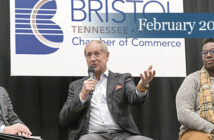By Scott Roberston
On July 19, 1987, the New York Times ran an article headlined, “Can Miami Save Itself?” The paper clued readers into its own opinion as to the answer to that question with the subhead: “A City Beset by Drugs and Violence.”
So having just run the headline, “Can Bristol, Virginia save itself?” let me clue you into my own opinion as to the answer. I honestly don’t know, but I sincerely hope it can.
The last vestiges of the city government that put Bristol into fiscal jeopardy have been swept away. Gone are the leaders who put their fingers in their ears every time someone pointed out the inherent risks in their free-wheeling retail gambles.
In their places are serious-minded individuals. These new folks are taking rational steps to determine what options exist to save the city from being unable to meet the bond payment requirements to which Bristol will soon be obligated.
The new mayor, Kevin Mumpower, is a responsible businessman who is entrusted by Bristol Compressors to make decisions affecting the lives and well-being of hundreds of individuals. He appears to be the right man for the job.
At the fifth annual State of the Cities luncheon in August, Mumpower didn’t dwell on the scope of the challenge facing the city, but he didn’t attempt to downplay or minimize it either. “Go big or go home,” is his mantra. It’s a theme that’s confident and realistic at the same time, because big changes are needed beyond just personnel at the top.
Bristol’s audit score is the lowest of any community in the Commonwealth, city or county. In July, the city council voted to have its financial and legal dealings since 2010 reviewed. The city may still have to cut firefighter or teaching positions. The city’s Industrial Development Authority has hired a consultant to create a new economic development strategic plan. There is hard work ahead, and that’s before the bond payments for The Falls start kicking in.
In lunching with him a few weeks after Mumpower’s State of the Cities appearance, I was taken by his willingness to reach out to some whom Bristol’s government has traditionally shunned – not the least of which is this publication, which was repeatedly critical of the previous city government.
Yet the most obvious example of Bristol’s new, more inclusive approach to problem-solving is the signing of a GO Virginia-based partnership with Washington County, Va. Born of discussions between County Administrator Jason Berry and new interim City Manager Randall Eads, the partnership looks to find cost-saving synergies between the two governments.
It’s something many thought they’d never live to see. The Bristol City Council and Washington County Board of Supervisors have a decades-long history of mutual ill-will. Outside of one legal agreement during the early days of The Falls planning, there has been little cooperation between the two.
Yet as I sat in the board chambers in Abingdon Aug. 8 and watched those two bodies jointly meet to discuss and eventually unanimously approve an economic development partnership resolution, I heard nothing but expressions of goodwill, hope and faith in each other.
Still, realism is the word of the day in Bristol now. When Supervisor James Baker suggested that Bristol might be able to help out by putting some cash toward a county project or two, City Councilman Doug Fleenor did a double-take and asked with a tone of incredulity, “Bristol, Virginia?”
Fleenor then cocked his head and joked, “Sure. Will you take a check?”
Well, no. Not yet.
But Bristol, Va., appears to be taking a more fiscally sensible approach than at any time in recent memory. A cynic might say that reaching out for partnerships today is nothing more than the flailing of a drowning man. That may prove to be correct in the long run. But if we’re more circumspect, the big picture is that the entire region needs Bristol to save itself. So kudos to those who have stepped up to bring responsible government to Bristol, Va., and kudos to Washington County for being the first to help.




